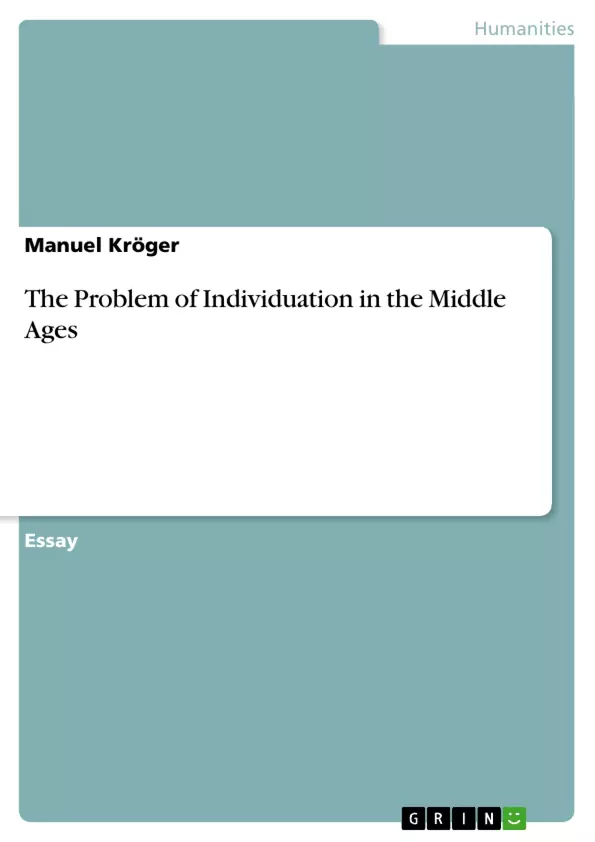This work is about how the problems of individuation and how it is discussed in the Middle Ages.
First it will give an overview about the core area of this philosophy and the problems of individuation generally: what does the term “individuation” mean and why does it lead to problems? What are the problems of individuation and how different philosophers tried to solve them?
Then it wants especially show, what Aquinas is thinking about it.
Another point of interest will be where this question has its philosophical beginning.
Inhaltsverzeichnis (Table of Contents)
- Introduction
- The Problem of Individuation - Intension of Individuality
- Medieval Authors about the Problem of Individuation
- Conclusion
- Resources
Zielsetzung und Themenschwerpunkte (Objectives and Key Themes)
This work explores the concept of individuation and its philosophical treatment during the Middle Ages. It begins by providing a broad overview of the concept, including its historical and philosophical significance. The author then delves into the specific views of Aquinas on individuation. The work also investigates the philosophical roots of the problem of individuation and examines its enduring significance for understanding the nature of individuals.
- The philosophical concept of individuation
- The views of Aquinas on individuation
- The origins of the problem of individuation
- The philosophical challenges posed by the concept of individuality
Zusammenfassung der Kapitel (Chapter Summaries)
- Introduction: This chapter introduces the topic of individuation in the Middle Ages and highlights the philosophical complexities surrounding the concept. It delves into the challenges of defining "individuality" and explores the historical context of these discussions.
- The Problem of Individuation - Intension of Individuality: This chapter examines the central questions and challenges associated with the concept of individuation. It explores various philosophical approaches and arguments, particularly focusing on the "intension of individuality" as outlined by Jorge J. E. Gracia.
Schlüsselwörter (Keywords)
The primary keywords and focus topics of this work include: individuation, individuality, Middle Ages, Aquinas, philosophy, metaphysics, ontology, essentialism, accidentalism, spatio-temporal individuation, indivisibility.
Frequently Asked Questions
What does the term "individuation" mean in philosophy?
Individuation refers to the process or principle by which a thing is identified as a distinct individual, separate from others of the same species.
Why did individuation lead to problems in Medieval philosophy?
The problem arises from trying to explain how a universal nature (like "humanity") becomes a specific, unique individual (like "Socrates").
What was Thomas Aquinas's view on individuation?
The work specifically explores Aquinas's thoughts, focusing on how he addresses the relationship between matter and individual identity.
Where does the question of individuation have its philosophical beginning?
The essay investigates the ancient philosophical roots that preceded the intense medieval debates on the subject.
What is the "intension of individuality" according to Jorge J. E. Gracia?
It is a concept explored in the text to examine the central challenges and arguments regarding how individuality is defined and understood.
What branches of philosophy are involved in this discussion?
The discussion primarily involves metaphysics, ontology, and the study of essentialism versus accidentalism.
- Citar trabajo
- B.A. Manuel Kröger (Autor), 2013, The Problem of Individuation in the Middle Ages, Múnich, GRIN Verlag, https://www.grin.com/document/263751



